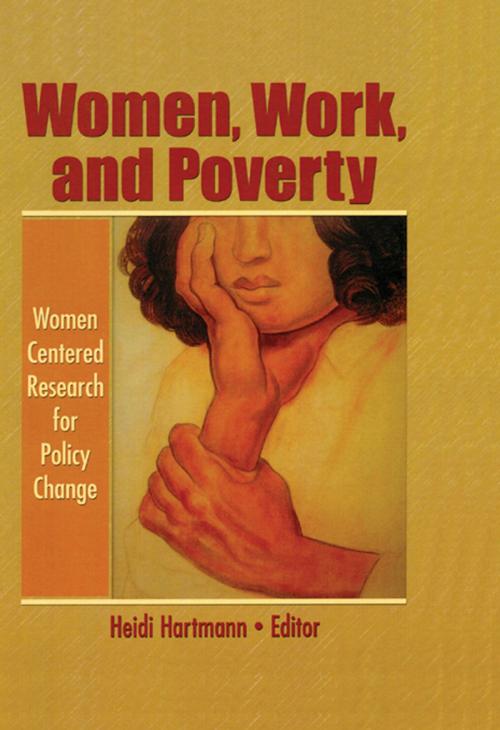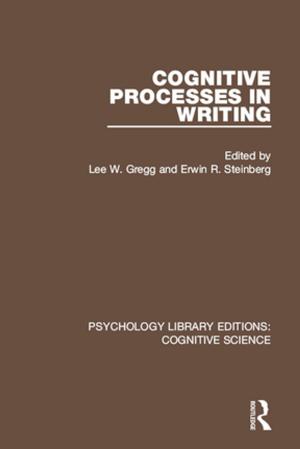Women, Work, and Poverty
Women Centered Research for Policy Change
Nonfiction, Social & Cultural Studies, Political Science, Government, Social Policy, Social Science| Author: | Heidi I. Hartmann | ISBN: | 9781135803230 |
| Publisher: | Taylor and Francis | Publication: | December 6, 2012 |
| Imprint: | Routledge | Language: | English |
| Author: | Heidi I. Hartmann |
| ISBN: | 9781135803230 |
| Publisher: | Taylor and Francis |
| Publication: | December 6, 2012 |
| Imprint: | Routledge |
| Language: | English |
Find out how welfare reform has affected women living at the poverty level
Women, Work, and Poverty presents the latest information on women living at or below the poverty level and the changes that need to be made in public policy to allow them to rise above their economic hardships. Using a wide range of research methods, including in-depth interviews, focus groups, small-scale surveys, and analysis of personnel records, the book explores different aspects of women’s poverty since the passage of the 1986 welfare reform bill. Anthropologists, economists, political scientists, sociologists, and social workers examine marriage, divorce, children and child care, employment and work schedules, disabilities, mental health, and education, and look at income support programs, such as welfare and unemployment insurance.
Women, Work, and Poverty illuminates the changes in the causes of women’s poverty following welfare reform in the United States, using up-to-date research that’s both qualitative and quantitative. Taking racial and ethnic diversity into account, the book’s contributors examine new findings on the feminization of poverty, the role of children and the lack of child care as an obstacle to employment, labor market policies that can reduce poverty and improve gender wage equality, sex and race segregation in the labor market, and the low quality of jobs available to low income women.
Women, Work, and Poverty examines:
-
marriage, motherhood, and work
-
pay equity and living wage reforms
-
community resources
-
welfare status and child care
-
acquiring higher education
-
advancing women of color
-
income security
-
repaying debt after divorce
-
gender differences in spendable income
-
women’s job loss
Women, Work, and Poverty is an invaluable aid for academics working in social work, social policy, women’s studies, economics, sociology, and political science, and for policy researchers, anti-poverty activists, and women’s leaders.
Find out how welfare reform has affected women living at the poverty level
Women, Work, and Poverty presents the latest information on women living at or below the poverty level and the changes that need to be made in public policy to allow them to rise above their economic hardships. Using a wide range of research methods, including in-depth interviews, focus groups, small-scale surveys, and analysis of personnel records, the book explores different aspects of women’s poverty since the passage of the 1986 welfare reform bill. Anthropologists, economists, political scientists, sociologists, and social workers examine marriage, divorce, children and child care, employment and work schedules, disabilities, mental health, and education, and look at income support programs, such as welfare and unemployment insurance.
Women, Work, and Poverty illuminates the changes in the causes of women’s poverty following welfare reform in the United States, using up-to-date research that’s both qualitative and quantitative. Taking racial and ethnic diversity into account, the book’s contributors examine new findings on the feminization of poverty, the role of children and the lack of child care as an obstacle to employment, labor market policies that can reduce poverty and improve gender wage equality, sex and race segregation in the labor market, and the low quality of jobs available to low income women.
Women, Work, and Poverty examines:
-
marriage, motherhood, and work
-
pay equity and living wage reforms
-
community resources
-
welfare status and child care
-
acquiring higher education
-
advancing women of color
-
income security
-
repaying debt after divorce
-
gender differences in spendable income
-
women’s job loss
Women, Work, and Poverty is an invaluable aid for academics working in social work, social policy, women’s studies, economics, sociology, and political science, and for policy researchers, anti-poverty activists, and women’s leaders.















